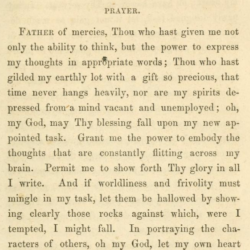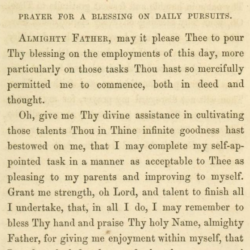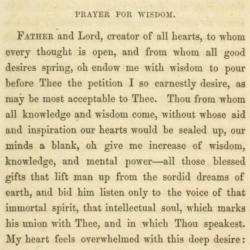| Contribute a translation | Source (English) |
|---|---|
Hymn of praise. | |
My heart overfloweth with gratitude, oh my God, and knoweth not how to address itself to Thee. Thy great mercies and Thy never failing goodness come before me, and my heart is overwhelmed with thanksgiving and my lips are dumb; but Thou, oh merciful and ever blessed God, Thou canst look into the inmost soul of Thy servants, and knowest their secret thoughts. How can I praise Thee for all the blessings with which Thou hast gilded my lot? | |
Teach me how to address Thee, oh my God, that my lips may utter forth the overflowings of my heart. How can I repay Thy never ceasing goodness? | |
Guide me, oh merciful God, that I may know what path is most acceptable to Thee. With unnumbered blessings Thou hast surrounded me, and I know not in what way to speak Thy praises. | |
Thou hast given me kind parents who have led me, beneath Thy guidance, in the right way. Oh, if my heart breaks when I think on all they have done for me, and I know not how to show my gratitude to them, how dare I hope to utter forth my gratitude to Thee, oh God, when from Thy hand all the happiness of this life cometh. | |
Thou hast in Thy mercy given me talents which are not bestowed on every one, and shall my foolish heart be lifted up in pride, and look down upon my fellow creatures. Oh, when I forget to whom I owe all these things, remove from me those gifts Thou hast bestowed on me, and sink me lower than those I may despise. | |
But my heart is not lifted up in pride; it overfloweth with gratitude, and knoweth not how to speak its praises. | |
Oh, when the affection of those of my fellow creatures who are dear to me, when their affection is mine, my heart gloweth in silent thanksgiving to Thee, oh gracious and merciful God, when they praise me for any talent I possess. For the exquisite pleasure such affection, such praise bestow, my heart is lifted up to Thee as the source of all, and longs to pour forth its gratitude in a song of praise. | |
Oh Thou who canst read the human heart. Thou who knowest the inability of words to speak Thy praise, let the silent gratitude that filleth my overflowing heart ascend to Thy Throne, oh our Father, and be accepted by the God of Israel. My lips are mute, but my heart is filled with gratitude. |
“Hymn of praise” by Grace Aguilar was published posthumously by her mother Sarah Aguilar in Essays and Miscellanies (1853), in the section “Sacred Communings,” pp. 184-185. In the UK edition of Sacred Communings (1853) the prayer appears with small variations of spelling and punctuation on pages 102-103.
As this prayer contains wards against pride due to praise, I infer that it was likely written upon receiving public acknowledgement and praise after completing and publishing an as yet unidentified writing project. Perhaps, the prayer may even have been anticipated by her “Prayer (Father of mercies),” a prayer of gratitude at the commencement of a writing project. The three writing projects of Aguilar’s completed in the 1830s while she lived in Teignmouth, Devon, were: The Vale of Cedars; or, the Martyr (begun in 1831 at the age of 15), her 1838 translation of Israel Defended by Orobio de Castro, and her The Magic Wreath of Hidden Flowers published in 1839 under anonymous authorship. –Aharon Varady
Source(s)



“Hymn of Praise, by Grace Aguilar (ca. 1830s)” is shared through the Open Siddur Project with a Creative Commons Public Domain Dedication 1.0 Universal license.





![[prayer for] saturday night, 25 february 1837 (Grace Aguilar 1853) - cropped](https://opensiddur.org/wp-content/uploads/2023/05/prayer-for-saturday-night-25-february-1837-Grace-Aguilar-1853-cropped-250x250.png)
![morning hymn (Blessed art Thou) [version 1] (Grace Aguilar 1853) - cropped](https://opensiddur.org/wp-content/uploads/2023/05/morning-hymn-Blessed-art-Thou-version-1-Grace-Aguilar-1853-cropped-250x250.png)



Comments, Corrections, and Queries